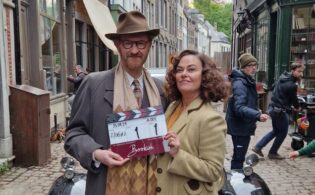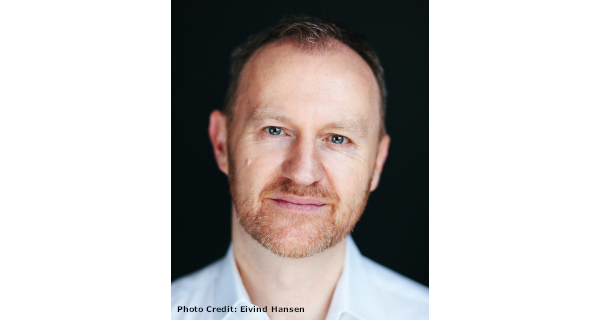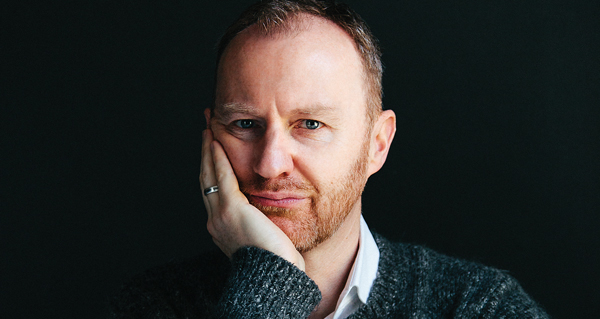Even amid a slowdown in the U.K.’s scripted sector, Mark Gatiss is managing to stay busy by flexing his multiple talents. He currently stars in the BBC and Masterpiece production Moonflower Murders, with a UKTV original, Bookish, which he also wrote, headed to screens in 2025. He frequently stars in and directs U.K. stage productions and, in 2025, will return to the Mission Impossible film franchise. Gatiss is currently at work on a new installment in the beloved A Ghost Story for Christmas franchise. American Public Television (APT) Syndication has partnered with BBC Studios to offer all six Ghost Stories installments for select public-television stations to independently choose to license and air in their local markets. Gatiss talks to TV Drama about his work on the BBC tradition and reflects on the state of the business today.
TV DRAMA: You’ve been making Ghost Stories installments for a while now. Take us back to the beginning. What made you want to be part of this classic BBC tradition?
GATISS: I loved them as a kid. Lawrence Gordon Clark’s 1970s ones were an absolute tradition in my house. The ones I remember the most vividly are The Treasure of Abbot Thomas, The Signalman and Lost Hearts. I watched everything supernatural when I was a child, and they were the ultimate expression of that. I’ve always loved Christmas and ghosts and the whole package. In 2013, I was asked by the BBC to do a documentary about M. R. James. It was one of the busiest years of my career. I look back at that year, and I can’t quite believe how much I did! I said I was too busy and they kept asking, so I said I’d do it on one condition, which is I write and direct another story. And they said yes. I did The Tractate Middoth and said, can I do another one? And they said, we don’t have any money! [Laughs] It took another five years of begging. The then controller of BBC Four said, Can you do it for X? I won’t say how little it was. That’s how The Dead Room happened. And I’ve done one every year since. It’s always a struggle. The problem is it’s an extinct format. It’s essentially a television play. It’s a half-hour. They are being grouped together now, and it has become anthology. But doing it once a year for half an hour, it’s very difficult to find the money. In the last years, BBC Arts has come through.
TV DRAMA: Is it a different creative process than working with a traditional 90-minute or 60-minute slot?
GATISS: They’re short stories, so you know essentially how it’s going to work. It’s not a novella. I did write a script for Casting the Runes, which is probably M. R. James’ most ambitious story. It simply wouldn’t fit in the slot. It’s definitely 45 minutes, at least! The one I’m doing this year is quite a small story. There is a natural structure to them. It’s like telling a joke. You know you want to end on some kind of nasty punchline. It’s quite a nice format really. You can do a lot in half an hour with a little story.
TV DRAMA: You mentioned Casting the Runes being too long for the slot. What are some of the other factors you consider when deciding what to adapt?
GATISS: It’s a combination of things. I’d always wanted to do Martin’s Close—it’s an underrated little story. It was doable because it wasn’t going to be very expensive. The year after, 2020, I wrote an original story, and then Covid happened. It was about old people dying in a hospital, and I thought, I think people want some M. R. James! So, in that instance, I chose The Mezzotint because I knew it was contained. It was made under Covid regulations. It’s about a drawing that appears to come to life. I knew I could do it because it wasn’t seven big crowd scenes! The one I’m doing this year, I knew we’d have to make the props of the tombs that come to life, and we couldn’t afford it, so I put it on hold and did Count Magnus, even though it’s set in Sweden. Sometimes, it’s a story you like. Sometimes, it’s what makes sense for the slot and the circumstances.
TV DRAMA: Christmas programming in the U.S. is synonymous with feel-good holiday movies. For those outside of the U.K., could you give some context for this British tradition of ghost stories at Christmas?
GATISS: A very easy international example is the enduring popularity of A Christmas Carol. In a way, Dickens invented the idea of Christmas and ghosts, except that he was tapping into a very old tradition of wintry storytelling. It’s an interesting time of year. It’s very jolly but also very melancholy. Christmas can be a difficult time for people. The ones we remember from our childhood are optimistic and positive. When you start losing people, it can become very sad. You’re looking backward and forward. It’s the perfect time to think about something else. If you feed into that the idea of Scrooge and a dark, wintry, snowy night and someone spectral turns up at your door, it all slots together! M. R. James used to read his stories aloud on Christmas Eve. It’s a weird thing. And incredibly British!
TV DRAMA: Now that it’s available as a collection, do you think audiences will watch all of them in one sitting? I would!
GATISS: From some audience research, we’ve found that people tend to watch two at once. That’s probably because they feel, I liked that, I’ll watch another one. You might not want to watch seven in a row. I keep arguing that we should either make two at once, to save money, or do a longer one! The BBC has been fantastic in helping me try to keep the tradition going. It’s a tough thing to sell, unless you can do something like this, which is group them together.
TV DRAMA: From your vantage point, as a writer, producer, director and actor, how do you see the scripted landscape today?
GATISS: It’s very exciting because it’s all changing. It’s scary. My new show for UKTV is probably going to come out next summer. Traditionally, summer is not a good slot. But now it is. No one knows anything! What’s happening at the moment, some of it is a natural reaction to the fact that post-Covid, it was like the Wild West out there. It was totally unsustainable. Everyone knew it was. So this is a corrective. But it hasn’t gone back to normal; it’s gone sub-normal. It’s so quiet! It’s definitely going to pick up soon. But the larger picture is interesting. Some of it is terrifying. A friend sent me an AI version of my voice. It was me talking. And it was petrifying. But I truly believe it’s a bit like the arts and crafts movement at the turn of the 20th century or 3D—AI will go to an extreme if we don’t all blow ourselves up, and then people will react against it because they want something tangible. That will be great news for theater. In terms of TV and film, it will be a craze, but people don’t want that [forever]. You don’t want it to look incredibly real. You want a patina of romance, otherwise it’s just your life. I hope that’s what will happen. There will be a pullback. I don’t want to be luddite about it. The evolution of it is endlessly fascinating. The talkies were the death of the silents; television was the death of cinema; we’ve been here many times. It tends to come back, doesn’t it?
TV DRAMA: I also think the U.K. and a lot of other markets have long known how to make television at more affordable price points; I expect a return to that would also help.
GATISS: Prog rock had lots of gatefold albums that cost millions, and then you needed punk to correct it. With a revolution comes smaller, more interesting stuff. I think that’s where we are. A lot of these big movies are too big to fail. But when they start failing, maybe something more interesting will come out of it.
 TVDRAMA
TVDRAMA






